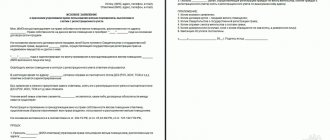What is an apartment under arrest
The concept of seizure of an apartment is that a ban is imposed on transactions with it. The reason for this is the debt of the property owner for utility bills, bank loans, seizure of property as collateral or other violations.
The ban is imposed in order to limit the violator’s right to dispose of the apartment until debts are repaid or the issues that served as the basis for the arrest are resolved. The owner of seized square meters cannot perform legally significant actions to transfer ownership of them (Part 4 of Article 80 of the Federal Law “On Enforcement Proceedings”).
For example, the restriction applies to transactions on:
- exchange;
- purchase and sale;
- inclusion of property in the will;
- using an apartment as collateral;
- rental.
The arrest acts as a strict restriction for the owner of the apartment, but its imposition does not prevent further residence and use of the property.
What is seizure of a share in an apartment?
The owner of a seized share in an apartment may temporarily lose the right to dispose of his property. At the same time, the rights to own housing are not limited; a person can live freely in this living space. What will it become impossible to do with your own share after its arrest?
- sell;
- exchange or give;
- to include in a will;
- deposit in a bank;
- rent out.
Thus, after arrest, it is only permitted to use the living space for personal purposes. The purpose of arresting a share of an apartment is to launch a further process of confiscation of housing for its subsequent sale by court decision in order to repay debts, or to return the share to the ownership of a third party who was illegally deprived of the right to this housing.
Reasons for seizing housing
A ban on the disposal of an apartment is used as a preventive measure against its alienation by the owner, when there are good reasons to believe that the housing will not be retained by the violating owner. Seizure is applied by government authorities if the owner of the property does not fulfill obligations to individuals or legal entities.
Let's consider situations in which reasons for seizure arise:
- The owner's large debt on credit obligations may lead to the seizure of valuable property, including real estate, in the interests of banking institutions, to ensure future repayment of the debt.
- If there are disputes between citizens regarding the division of an apartment , which is part of the inheritance estate, at the request of a notary, the apartment may become subject to a ban on alienation.
- When mortgaging an apartment to a pawnshop, its safety can be guaranteed by seizure until the borrower pays off financial debts.
- The court has the right to seize housing to secure a statement of claim when there are suspicions about the preservation of property rights of the current owner-defendant.
- The bailiff service applies restrictions on apartments both on the basis of a judge’s writ of execution , and during the enforcement case independently to ensure payments for loans, alimony payments, fines, and compensation for damage caused.
- Utility debt.
- Compensation for material damage caused by the owner of housing to citizens or legal entities.
- Overdue arrears when repaying tax payments.
An apartment may be seized only in strict accordance with the law and only with documentary evidence of the grounds for applying such a restrictive measure.
Grounds for seizure
This, however, can be avoided. If the seizure of real estate by bailiffs has already been carried out, you should not shy away from negotiations with the bank. If the financial situation worsens, the borrower may apply, for example, for debt restructuring. Without this cooperation, the apartment can not only be seized, but also sold at public auction.
Compensation for damage caused by a crime
In practice, even in this case, foreclosure on ½ or another share rarely produces results. If the share is put up for auction, there is unlikely to be a buyer for it, since such real estate, as a rule, is not in demand.
A ban on the disposal of assets may be initiated by the inquiry authorities as part of the investigation of criminal cases. In such cases, sanctions against a house or apartment may be recognized as providing compensation for damage in a criminal case or as a precursor to the confiscation of property by a court verdict.
The procedure for seizing real estate
The process of seizing an apartment is carried out during enforcement proceedings by order of a judge, bailiff or government agencies. The enforcement service is obliged to notify the owner of the property and other interested parties about the start of the procedure.
Within 10 days after receiving the writ of execution, the owner can pay off all debts, thereby preventing the apartment from being seized. During this period, the imposition of a ban is not allowed. If voluntary repayment does not occur, then the executor performs the following actions (Article 64 of the Federal Law “On Enforcement Proceedings”):
- conducts an inventory of property and seizes it by drawing up a special act;
- performs real estate valuation;
- sends the apartment to public auction in order to sell it and obtain funds to pay off the debt.
In the act of seizure of real estate, the bailiff indicates the following data (Part 5 of Article 80 of the Federal Law “On Enforcement Proceedings”):
- characteristics of the home : general condition, visual assessment of repairs, number of rooms and premises, floor;
- passport details , residential addresses and signatures of witnesses present;
- information about the person who is responsible for the safety of square meters.
Debtors should be wary of undervaluation of property, so they need to insist on an examination of the value by licensed institutions.
For what and who imposes arrest?
First of all, we note that only a court can seize real estate.
As a rule, a court decision to seize an apartment is made if there is reason to believe that the owner of the property will try to sell it. Let's consider the situation of seizure in situations where the court hearing is still quite far away, but the owner is already taking action to sell the apartment. In such a situation, the second party submits a petition to the court to take urgent measures to secure the claim, as well as a package of documents that prove the validity of the seizure.
This type of request is considered directly on the day it is submitted. The decision made is sent to the registration authority and the defendant. In this case, the applicant is issued a writ of execution, which, if necessary, he can take to the service for the execution of court decisions.
Where to get information about the arrest of a home
You can obtain information about current restrictions on an apartment via the Internet or the Unified State Register. It is not difficult to obtain a certificate from the register - this is done so that landlords or buyers of real estate can be sure that there are no prohibitions on the subject of the transaction.
To prepare a paper extract from the Unified State Register in accordance with clause 1 of Art. 333.33 of the Tax Code of the Russian Federation, it is necessary to pay a state duty in the amount of 400 rubles. for citizens or 1200 rub. for legal entities (150-300 rubles are charged to receive an electronic document). You can refer to the following sources:
- federal registration service;
- multifunctional centers;
- Rosreestr website;
- agencies on web portals.
Courts and bailiffs, when applying an arrest, inform the Rosreestr authorities about this, and they enter the information into the Unified State Register. therefore, the statement does not always contain up-to-date information. In this case, you can use two more resources: the district court website and the bailiff service department.
On the website of the judicial authorities, look for information about the existence of claims against the owner of the property and decisions made on this issue. In the FSPP, inquire about the seizure by the executor of the home for debts.
Which authorities have the right to seize an apartment?
A judge or bailiff can apply a restriction in the form of seizure of an apartment. The court makes a corresponding decision during court hearings to secure the statement of claim (clause 1, part 1, article 140 of the Code of Civil Procedure of the Russian Federation), and the executive service - on the basis of a court writ of execution or within the framework of an enforcement case (part 1, article 80 of the Federal Law "On enforcement proceedings").
When investigating criminal cases, seizure of property can also be requested by investigative or inquiry bodies (Article 115 of the Code of Criminal Procedure of the Russian Federation), and in the course of their activities, tax authorities or the customs service can initiate a ban (Part 1 of Article 77 of the Tax Code of the Russian Federation).
In what cases and who can seize property?
The arrest process consists of several stages. After satisfying the claimant's application, the bailiff draws up an inventory of the property. Documents are also being prepared on the activities carried out and on the measures taken in relation to the debtor’s property. If certain items are confiscated, these facts will be documented.
How is the arrest and inventory of the debtor’s property carried out by bailiffs at the place of registration?
- Arbitration courts.
- Courts of general jurisdiction.
- Tax authority.
- Customs service.
- Prosecutor.
- Investigator or interrogator.
- Bailiffs.
A ban on the disposal of assets may be initiated by the inquiry authorities as part of the investigation of criminal cases. In such cases, sanctions against a house or apartment may be recognized as providing compensation for damage in a criminal case or as a precursor to the confiscation of property by a court verdict.
When seizure of an apartment is prohibited
The law establishes a list of property that cannot be recovered (Article 446 of the Code of Civil Procedure of the Russian Federation). The list also includes real estate, but a ban cannot be applied to it only when seized for the purpose of sale in some situations.
Thus, arrest for sale cannot be applied if the apartment is the only real estate of the debtor (clause 1 of Article 446 of the Code of Civil Procedure of the Russian Federation). This rule does not apply to cases of pledging real estate to obtain a loan and imposing a ban to collect debt.
Example.
Citizen Vasiliev asks to recover money in the amount of 200,000 rubles from Ivanov’s business partner, and to fulfill the obligations he asks to seize and sell the defendant’s apartment. The court did not seize Ivanov’s apartment for the purpose of sale, since he and his family live in the same apartment, and he does not own any other real estate.
In the event that Ivanov took out a loan secured by an apartment, then seizure would become possible if he failed to fulfill his financial obligations. Also, if enforcement proceedings have been opened against Ivanov to collect alimony, then the bailiff has the right to seize the only housing, but only for the purpose of stimulating the repayment of the debt.
Real estate is not subject to arrest if the ratio of the amount of debt and the cost of the apartment is disproportionate (Part 3 of Article 140 of the Code of Civil Procedure of the Russian Federation). So, with a debt of 30,000 rubles. the court will never seize an apartment worth 1,500,000 rubles. to pay off the debt through sale.
Options for canceling the seizure of an apartment
If the buyer of an apartment becomes aware of the existence of a lien on it when completing the transaction, then there is no need to rush and refuse the purchase, so as not to have to collect the paperwork for the purchase and sale agreement again later. It is better to immediately find out the reason for the ban - often the procedure for lifting the arrest takes time, and it is quite easy to cancel it.
While the seizure of the apartment is being lifted, to ensure the security of the transaction, you should contact the registration service or the MFC with an application to suspend the registration procedure, indicating the reason and the period for which it needs to be stopped. To lift the ban, you need to eliminate the reasons for its application:
- pay debts in full;
- resolve the legal dispute in which the arrest was imposed.
An application to lift the arrest should be submitted to the body that applied it (Article 141 of the Code of Civil Procedure of the Russian Federation).
Cancellation of the arrest is possible if there were violations during the seizure:
- there were procedural violations on the part of the executive service;
- the recovery was aimed at property not subject to prohibition;
- if restrictions on the apartment violate the interests of other persons, for example a child registered in the living space;
- the ban was imposed on the entire apartment, although the debtor owns only part of it.
Is it possible to seize the pledged property?
The current legislation prohibits the seizure of property that is pledged. At the same time, the Constitutional Court indicated that the rights of the pledgee in the event of the sale of such property are not violated due to the preservation of the pledge itself (Determination of the Constitutional Court of the Russian Federation dated May 25, 2017 N 1093-O).
Collateral lawyer in Yekaterinburg
IMPORTANT : the main thing is that the bailiff does not take actual measures to foreclose on the mortgaged property. Then the actions of seizing the pledged property without presenting evidence of a real violation of the rights and legitimate interests of the pledge holder or other persons as a result of the issuance of a contested decision by the bailiff will not occur.
- The “header” indicates the name of the court and the full name of the defendant in the case.
- The main part describes the circumstances under which the arrest was made. The following is the rationale: why it is necessary to remove the encumbrance from the share.
- Request for cancellation of interim measures.
- List of applications.
- Date and signature.
The seizure of a share in an apartment is one of the measures aimed at preserving the debtor’s property and at the same time stimulating him to fulfill his obligations. If the owner considers that the ban on the disposal of shares is not justified, the actions of the bailiff can be appealed by filing a complaint with the senior bailiff or in court.
Grounds for arrest
- be in premises that do not belong to the debtor;
- make an inventory of property without permission issued by a senior bailiff;
- visit the debtor on weekends or at night.
30 Apr 2021 vektorurist 91
Share this post
- Related Posts
- Can the interest rate on a mortgage be reduced after the birth of 2 children?
- Benefits for low-income families in Barnaul
- Is it possible to submit insurance premium payments on paper in 2021?
- Does the bank have the right to seize property in which I am registered but not the owner?
Statement of claim
To lift the arrest by filing a claim, you need to prepare a corresponding application and submit it to the court. Filing a claim is limited by two deadlines: a three-year limitation period from the moment the ban was imposed (Part 1 of Article 196 of the Civil Procedure Code of the Russian Federation) and the moment of sale of housing as part of confiscation (Part 1 of Article 442 of the Civil Procedure Code of the Russian Federation).
In the claim, the applicant states the following:
- time of inventory of property and application of arrest;
- the resolution that initiated the sanctions;
- characteristics of real estate.
In the text, it is important to note the bailiff’s procedural violations, if any, and argue your position. Attached to the claim:
- check for payment of state duty;
- a copy of the arrest warrant;
- documents confirming ownership of the apartment;
- documentation to substantiate the applicant’s position on the illegal application of the ban.
Appealing the seizure of real estate in the courts
Appealing against arrest is an inalienable right of the debtor (Part 1 of Article 441 of the Code of Civil Procedure of the Russian Federation). The bailiff is obliged to comply with the law and not violate the following points:
- The presence of bailiffs is allowed only in housing owned by the debtor.
- Inventory of housing and confiscation are permitted only with the written permission of a superior bailiff.
- Enforcement actions are not permitted at night or on weekends.
Violation of the above points serves as a reason for appealing the actions of the perpetrators and illegal arrest on the basis of Art. 442 Code of Civil Procedure of the Russian Federation.








